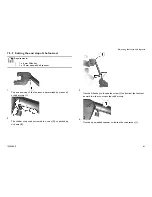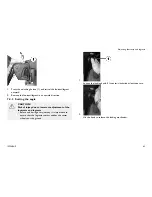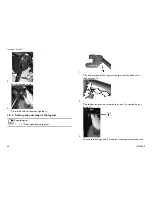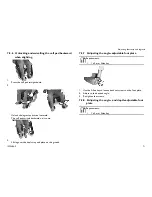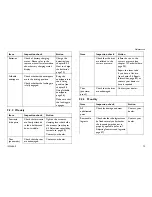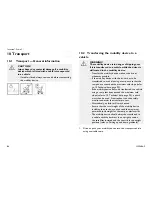
Invacare® Storm®⁴
8 Electrical system
8.1
Electronics protection system
The vehicle drive electronics is fitted with an overload protection.
If the drive is severely overloaded over a long period (for example,
during steep climbs) and, above all, at simultaneous high external
temperatures, the electronic system can overheat. In this case,
the vehicle performance is gradually reduced until it comes to a
standstill. The status display shows a corresponding flash code (please
refer to the user manual for your remote). If you switch the drive
electronics off and then on again, the error message is deleted and
the electronics can be switched on again. It can however take up to
five minutes until the electronics has cooled down enough for the
drives to apply their full performance.
If the drive is blocked due to an insurmountable obstacle, for
example, a curb or similar which is too high, and the driver attempts
to run the drive for more than 20 seconds against this obstacle, the
electronic system switches the drives off to avoid damage. The status
display shows a corresponding flash code (please refer to the user
manual for your remote). If you switch the drive electronics off and
then on again, the error message is deleted and the electronics can
be switched on again.
NOTE
–
A defective main fuse may be replaced only after
checking the entire electric system. An Invacare
specialised dealer must perform the replacement. You
can find information on the fuse type in 12 Technical
data, page 95.
8.2
Batteries
Power is supplied by two 12 V batteries. The batteries are
maintenance-free and only need regular charging.
In the following, you find information on how to charge, handle,
transport, store, maintain, and use batteries.
8.2.1
General information on charging
New batteries should always be fully charged once before their first
use. New batteries will be at their full capacity after having run
through approx. 10 - 20 charging cycles (break-in period). This
break-in period is necessary to fully activate the battery for maximum
performance and longevity. Thus, range and running time of your
mobility device could initially increase with use.
Gel/AGM lead acid batteries do not have a memory effect as NiCd
batteries.
8.2.2
General instructions on charging
Follow the instructions listed below to ensure safe use and longevity
of the batteries:
•
Charge 18 hours prior to initial usage.
•
We recommend charging the batteries daily after every
discharge even after partly discharge, as well as each night over
night. Depending on the level of discharge, it can take up to 12
hours until the batteries are fully charged again.
•
When the battery indicator reached the red LED range, charge
the batteries for 16 hours minimum, neglecting the charge
complete display!
•
Try to provide a 24 hour charge once a week to make sure that
both batteries are fully charged.
•
Do not cycle your batteries at a low state of charge without
regularly recharging them fully.
74
1529686-P


